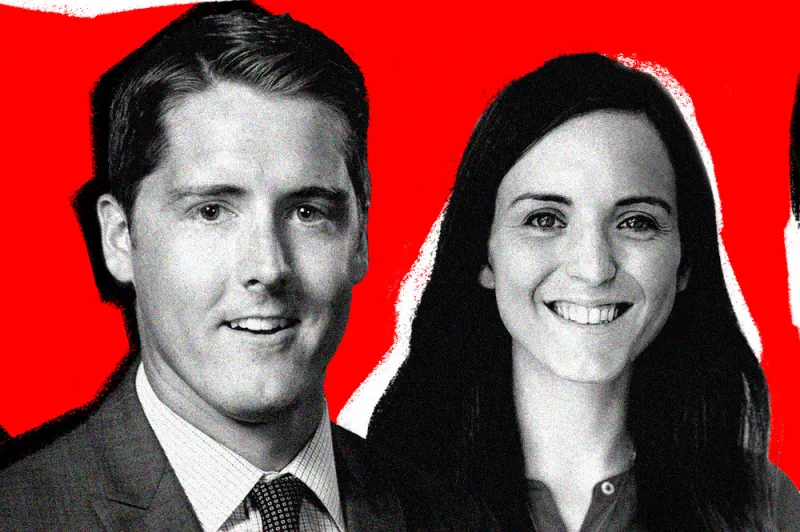Profiles are regularly written about seasoned, stalwart wealth managers and their latest ventures or achievements. But young advisors — who account for a disproportionately small percentage of the aging workforce — are building thriving advisory practices, too.
One reason we don't hear much about young advisors is simply because there are few of them. According to Cerulli Associates, just 10.3% of U.S. financial advisors are under 35. Ageism also persists against this demographic.
Some clients show a clear age preference, or bias, for the older advisor over the younger advisor who has joined the practice, says Michael Kitces, head of planning strategy at Buckingham Strategic Partners, co-founder of the XY Planning Network and publisher of the industry blog “Nerd’s Eye View.”
It’s “usually expressed in comments like ‘Oh, you remind me of my grandson! It seems just like a few years ago that I was helping to change his diapers!’” says Kitces.
RIA Intel recently caught up with two young advisors who are proving their credibility and placing tremendous emphasis on building and maintaining client relationships. Part of their secret, it seems, is they self-identify as “old souls”—and that’s how others see them too.
“I’m 28 but I feel like I’m 38,” says Daria Victorov, a CFP and a financial planner with Abacus Wealth Partners in the San Francisco Bay Area.
Victorov, whose parents worked two jobs apiece, had to grow up quickly. Making her own lunch, doing her laundry and working to pay for things she wanted were all part of her childhood routine. At 12, Victorov began walking neighbors’ dogs. By 14 ½, she had working papers and a job at a spa. During high school and college, she was a barista at Starbucks.
Her jobs exposed her to clientele and colleagues who were much older then herself, she says, and taught her how to work with people, develop relationships, and effectively communicate. “At 5 a.m., you definitely experience some cranky people,” she says, recalling Starbucks.
She still thinks about an extremely picky regular customer and her recurring order: a triple grande, two-thirds caffeinated, no foam, 195 degree, two Splenda latte with skim milk. Victorov (who points out that milk can curdle at 195 degrees) says she managed to win the trust of this customer, who none of her colleagues liked working with.
The experience also taught her that sometimes you have to pay more attention to clients than you anticipate and that finding solutions can take longer than expected—lessons she says have served her well in her financial planning career.
Victorov recognized years later that her barista job exposed her to customers of varying net worth—as does Abacus Wealth Partners. The RIA, which has approximately $2.5 billion in assets under management, doesn’t require a minimum investment and serves 1,700 households.
Her early jobs also taught her how to be a “chameleon,” she says, by adapting to clients’ language and needs while remaining professional. She tries to learn about clients’ interests and asks them many questions.
Victorov, who put herself through Virginia Tech and has paid off nearly half of her $30,000 in student loans, planned to major in corporate finance. But when she took an introductory financial planning course to learn how to manage her own finances, she got hooked. A big attraction was the relationship aspect of being an advisor.
“If I wasn’t a financial planner, I’d probably be a vet,” declares the animal lover.
Victorov works on a virtual team at Abacus but also meets in person with clients across the country. Video chat is her preferred mode of virtual communication. Her clients range in age from 22 (the founder of a tech company) to 81.
She prefers working with clients who are at least 35 years old, which she attributes to her maturity level. She really likes helping “sudden money” people navigate their new financial status and making the most out of wealth they’ve inherited or acquired through equity compensation—a common occurrence in the Bay Area.
Victorov’s extracurricular interests have also helped her develop useful skills for financial planning. Boxing at a local gym has strengthened and empowered her, she says.
“The thing I really like about boxing is there’s no opportunity to daydream—you really have to think about what you’re doing,” she says. “It’s also very good stress relief, and I think that can make you think more clearly.”
Taking an improvisation class has also taught her to “roll with whatever punches come your way, as opposed to freezing and being uncomfortable,” she says. Her biggest test here came when her instructor changed the scenario from doing Pilates to giving birth.
Victorov joined Toastmasters about a year ago. “I think it completely reshapes and rebuilds your confidence,” she says, whether speaking to a small or large group in person, over video or on the phone. Her Toastmasters training has made her very cognizant of not using filler words, she says, and it helped her when presenting to colleagues at Abacus’s company retreat.
Victorov took an online business writing class at the suggestion of her supervisor at Abacus and has also taken creative writing to help improve the flow of her writing. “Although English is my first language, it sometimes feels like it isn’t,” she says, because her father spoke with her in his native Russian while she was growing up.
Her multicultural upbringing has also been a great asset. “I can communicate with anyone of any age,” says Victorov, an avid traveler who has visited nearly 20 countries. Family, food, and travel are among her break-the-ice conversation topics with clients. When a client recently visited Amsterdam, Victorov asked her to share travel recommendations.
The biggest skeptics she’s found are the pro bono clients she advises through the Financial Planning Association. They’re the ones who most often say to her, “‘How old are you? How long have you been in this business? I hope you have enough experience to be sitting in the chair in front of me,’” she says.
“I think they just want answers more quickly,” she says. “They’ve had these burning questions and they finally have an opportunity to ask them.”
She explains to them that she’s a CFP. She also tries to joke that she’s not going anywhere and that “just because I don’t have gray hair doesn’t mean I’m not qualified to be here,” she says. “Usually they get over it quickly.
Victorov was just a nine-year-old during 9/11 and a teenager during the Great Recession. She is trying to stay calm and ahead of the game with the coronavirus, she says, and is focusing on facts, logic, and things that can be controlled. Monte Carlo scenarios have helped. She is also meeting clients where they are in their thinking.
In financial planning like in boxing, “there’s going to be times that you remember those combinations and you have your plan,” she says, “and there’s going to be times where things are going to come out of the blue like coronavirus or a left uppercut.” Acting paralyzed in a boxing ring won’t do any good, she says, “and in financial planning, if you just freak out and don’t do anything about it, that’s not good either.”
For Charles “Doug” MacLean, 29, a registered rep and investment advisor with Barnum Financial Group, an affiliate of the Massachusetts Mutual Life Insurance Company, the coronavirus is also his first crisis “on the professional side of the table,” he says.
MacLean, based in Stamford, CT., has been learning a lot from his colleagues about how to relay information and have an open dialogue with clients about these unprecedented times. Coronavirus “has been a whirlwind of ups and downs,” he says, but he has long been accustomed to using images and illustrations, slowing things down with older clients and explaining, “Here’s why we’re doing this.”
When MacLean first joined Barnum, “people joked that I’m an old soul,” he says. “But I’ve always been comfortable with older people.” When visiting his friends at their parents’ homes, he always hung out with their parents, too.
“Older people have been through a lot more things and have a different point of view,” he says, “so just being myself, being open and honest and having meaningful conversations” is what works for him. “You don’t have to be someone you’re not or change your personality.”
MacLean recently visited a client who lives 45 minutes away. “What could’ve been 20 minutes in and out,” he says, became an hour-long conversation over a cup of coffee—in which he spoke with the client about golf, the clients’ kids and cars.
With retired clients, “Sometimes we talk way more about their lives and the news and less about business,” he says.
MacLean is glad he took an etiquette class as an undergraduate in the business school at Sacred Heart University. That’s where he learned to balance a glass of wine and a napkin while shaking hands. The formal dinners he attended at college prep boarding school also helped prepare him to feel at ease in social business settings.
MacLean advises many of his friends, some of whose parents have also become clients. “I earn the opportunity to sit down with them,” he says, because they see how he is successfully advising their children. “They give me a chance.”
He’s especially proud of client relationships he’s developed with parents he didn’t know until after he started working with their kids. “They’re meeting me because of my track record,” he says. Some of his friends’ parents left their former advisors to work with him.
About 75% of MacLean’s book of business is friends and family. “I value my friendships more than I value income or salary or production,” he says. “I never want to let business get in the way of our friendship.” So he maintains open lines of communication, sets expectations early and makes it a point to get ahead of issues before they may arise.
MacLean, who played hockey for Sacred Heart, has met some clients through the university’s hockey alumni association. Older members see him year after year at events and know he’s established his business—and sometimes conversations lead to meetings.
Another networking strategy he employs is going to the golf course some days that he has no meetings. He likes getting paired with three people he doesn’t know. The other members of his foursome are typically retirees and business owners over age 50.
MacLean had to grow up fast because his mother has early onset dementia. This has helped him better understand how to help clients figure out things such as long-term care, which he says his mom will need in the future.
Building close relationships with clients has also enriched his life on a personal level. “They always check in to make sure I’m good, mom’s good, family’s good,” he says, “Having that extra level of support has been great.”







